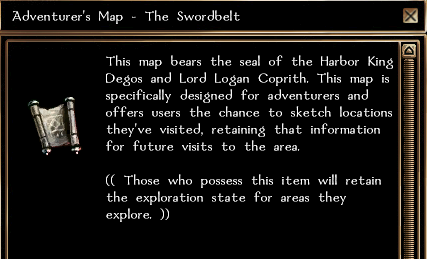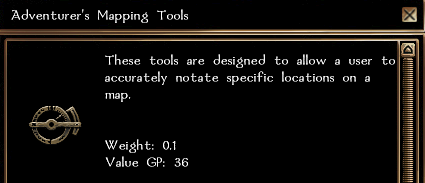Overview
TDN's Exploration System is comprised of four subsections:
- Persistent Exploration
- Persistent Map Pins
- Points of Interest (POI) / POI Journal
- Dynamic Events
Persistent Exploration
In order for a Player to retain Exploration in each area, they are required to purchase an "Adventurer's Map" for the country they are in. This can be purchased from the General Goods Merchant in towns and Cities. After the player has ownership of the Map, their exploration will be saved as they travel within an area.
Image of the Item:

Q&A
Q: Can Exploration Maps be shared with other Players?
A: No, Exploration is player-specific and cannot be transferred. It is up to players to justify why this is the case IC.
Q: Where can these be purchased?
A: Delver's Den in Trademeet, or Gwardle & Snagswyck’s in Cobblestone Way, Murann.
Persistent Map Pins
A critical aspect of adventuring is making notations on major landmarks or locations that might be of use to the adventurer later on. "Adventurer's Mapping Tools" are purchased in stacks of five at your local General Goods Merchant, and are required for each Map Pin used. Map Pins recorded in this way will be persistent.
Image of the Item:

Q&A
Q: What happens if I attempt to place a Map Pin without the Mapping Tools?
A: Nothing, the Map Pin will not be placed on your mini-map.
Q: Can I share Map Pins with others?
A: No, similar to exploration persistence, these are PC-Specific.
Q: Where can these be purchased?
A: Delver's Den in Trademeet, or Gwardle & Snagswyck’s in Cobblestone Way, Murann.
Points of Interest (PoI) / PoI Journal
PoI (Points of Interest) are Skill based triggers that you may stumble upon anywhere in the server, primarily utilising Knowledges and character Hit Dice, though other Skills may also see use at times. They can range from an overgrown landmark detailing the area's history through Knowledge: Religion, to an obscure runic tablet revealing a hidden dungeon via Knowledge: Arcane. The objects these triggers are attached to often act as landmarks, but this is not always the case - some are meant to be less noticeable, if not outright hidden.
Any player can discover all PoI, however there is failure and success associated with these triggers. Successful rolls grant XP, and always reveal more than a failed roll, which might in fact reveal nothing at all. Failed rolls do not give any XP. In addition successful rolls record the discovered text in your journal, whereas failed rolls do not.
Narratively, the learning process of successful PoI is left up to the player within reason. You can RP out pursuit of PoI knowledge as seeking out locals or experts, as research through dusty and obscure tomes (or public ones for easier PoI), or as something your PC knew beforehand, as long as the logic and rationale behind this is reasonable.
Individual PoI can be revisited once every reset to attempt rolls again.
Dynamic Events
Dynamic Events are, simply put, random encounters across the module, ranging from bandit ambushes to different NPC factions battling one another, to wandering merchants and flavourful NPCs with potentially subtle hints of secrets or even more direct dialogue of such. Most, however, serve the purpose of sharing area specific lore (which may include hints or straight-forward knowledge of dungeon locations), whether of the one you find them in or its surrounding areas. Many NPCs also impart general setting knowledge as well as more particular lore unto players when spoken with, much of which offers alternative and different perspectives compared to PoI and other sources of information.
The foundation of this system is fairly simplistic for launch, with the intention of iterating and expanding upon it over time, such as adding the tools for devs to set up entire scenes with placeables and more intricate interaction, for example being able to talk one's way out of a brigand ambush, etc.

